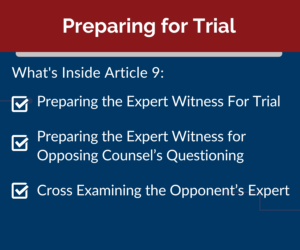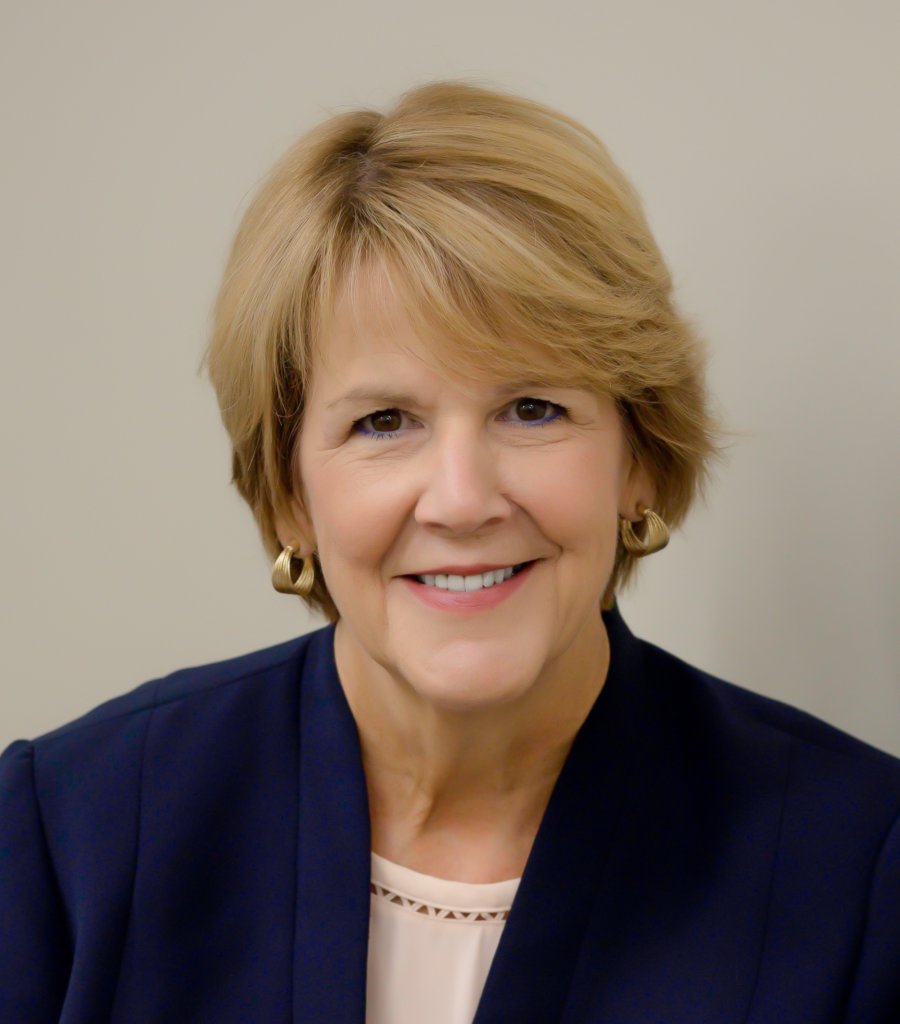
Article 9: Preparing for Trial
Welcome back to our series on working with a financial expert in business litigation. If you missed the last article that explored how to prepare a financial expert for deposition, you can read it here.
This time, we are discussing how to prepare the expert witness you’ve engaged for trial, and a few suggestions for cross-examining the opponent’s expert.
Here are some strategies and tips for trial preparation, based on our 45+ years of experience serving as financial expert witnesses in state and federal courts.

Preparing the Expert Witness for Trial
When preparing to give testimony in court, the financial expert needs to know the facts of the case, not just the facts needed for calculating damages, so they can relate those facts to their specific expertise.
The ability to communicate these facts and details clearly, explaining complex principles in plain English, is crucial. Experts should avoid technical terms when possible, or at least explain them. Watching the jurors’ or judge’s faces can reveal if they are following and understanding the testimony.
And speaking of eye contact–it is important to look at the person asking the question while the question is being asked, but then the expert should respond, with eye contact, to the jurors or judges. These are the individuals the expert is trying to help understand their opinions and how such opinions were reached.
In court, be sure your expert knows to teach, not preach. Preaching is a turn-off and can negatively impact the court’s impression of the expert; however, projecting self-confidence is important for credibility, as is acknowledging weak points in the case if raised.
To help communicate the key facts leading to their opinion and their respective report, exhibits such as chalkboards and other visual aids can be helpful. If the expert is allowed to get out of the witness chair, make sure they do, to increase engagement.
Here are some additional strategies and tips for preparing an expert witness for trial:
- Start with a review of the expert’s deposition transcript. Identify key assumptions and issues, and determine how the expert will explain these.
- Encourage the witness to consistently display objectivity, which is crucial to credibility.
- Provide the financial expert with the opinions of other witnesses you have retained to minimize potential inconsistency and/or disagreement between experts. This is often overlooked, but very important. Providing transcripts to the expert of the key witnesses throughout the course of the litigation can ultimately prevent the expert from being surprised on the stand.
- Frame questions so the expert can explain why his or her opinion is right, versus why the opponent’s financial expert is wrong.
- Work with the expert witness in a “mock” trial to help the wintess gain famililarity with the courtroom process.
- Go over the layout of the courtroom and where the expert should stand if the judge allows them to leave the witness stand.
- While the importance of knowing the technical aspects of the case are obvious, the importance of rapport with the court cannot be overstated. Review the following with the expert and make sure they understand the implications of:
-
◦ Controlling body language
◦ Avoiding any signs of arrogance
◦ Never interrupting the judge or attorney
◦ Making eye contact
◦ Speaking simply
◦ Not having visible emotional reactions
Preparing the Expert Witness for Opposing Counsel’s Questioning
The expert you hired should understand that opposing counsel will likely investigate them before trial in an attempt to gain an advantage for their client.
Opposing counsel may look into the expert’s professional background, to see if they actually have the credentials they cited. They may investigate what other counsel have hired the expert or been adverse to the expert in the past. Past disqualifications and testimony, including depositions, trials, mediations, hearings, and reports are potentially available for scrutiny.
Suggestions to share in preparing the witness for cross-examination:
- Bring the valuation report. The witness should always bring their valuation report to the witness stand (or it may require that it be entered formally as an exhibit by you). They are not expected to memorize everything and should refer to the valuation report as often as needed. Providing answers by reading directly from their report is a way to make sure that what is being testified to is exactly as it was presented and makes it more difficult for counsel to misrepresent the expert’s work.
- Encourage the expert not to “guess” or “estimate”. If the answer truthfully is, “I don’t know,” it’s acceptable to say that you are not sure, rather than making up an incorrect answer.
- The expert shouldn’t argue during testimony. They are there to educate, not advocate for anything but their opinion.
- Talk with the expert about how to address any inconsistencies, mistakes or omissions because this shows intellectual honesty. Best practice is to admit a mistake, correct it, and continue on with the testimony.
- Remind the expert to avoid getting defensive about experience or credentials. They should be confident in why their opinion is appropriate based on thorough analysis and the particular facts of the case at hand.
- Remember the importance of re-direct. The valuation expert can further explain areas questioned or clarify confusion that occurred during cross-examination. Redirect is also a time to finish answering questions if they were cut off by opposing counsel.
- The expert should not answer vague, leading questions or those they do not understand. Instead they can state the problem with the question as it was asked, and ask to rephrase.
Cross Examining the Opponent’s Expert Witness
Each litigation attorney needs to prepare for cross examining the opponent’s expert and how this is approached varies greatly depending upon the particular situation. One area of questioning that is too often missed is determining if there is potential bias, prejudice or conflict of interest. Elements to consider might include the following:
- Is the opposing expert often aligned with the plaintiffs or defendants?
- Does the witness have industry or governmental affiliations that would benefit from his or her testimony?
- Does the witness frequently work with the same attorney and never against that attorney?
- Is there an inherent conflict of interest? Does the witness’s firm receive other fees/income for other professional services provided (accounting, financial planning, etc.)
- Is the expert being compensated based on a contingency fee?
Generally, counsel’s goal is to establish that the witness has an incomplete understanding or a misunderstanding of the facts of the case, based on what has been learned in deposition. Challenge the assumptions of the witness and identify miscalculations in the report. As a reminder from prior articles, the financial expert you hired can help you with this. Incorrect assumptions or miscalculations cause incorrect conclusions.
Explore the outer reaches of the expert’s opinions. At what point does the expert’s work become neutral or even favorable to your position?
Conclusion
In this article, we have shared a selection of our insights and tips based on our extensive experience as financial experts in the area of business valuation and business damages. While it is impossible to cover this expansive topic in a single article—in fact, many entire books have been written on the ideas we discuss here—we hope you find immediate actionable value in what we have summarized.
Coming up Next Time
Next time, we will explore why you should consider hiring a CFE (Certified Fraud Examiner) in matters involving complex financial transactions or known / suspected fraud, including potential steps to take to preserve evidence and what items to consider in discovery.
We’re Here to Help
Hiring the right financial expert can have a significant impact on your case. Based on our firm’s 45+ years of experience focused entirely on determining damages and valuing businesses, we can provide insight, experiences, and ideas for ways to approach the financial portion of your litigation project that you may not have encountered yet.
Stay tuned to your inbox and follow Capital Valuation Group on LinkedIn as we share more from this series on successfully navigating each phase of the litigation process. If you have a particular situation you would like to discuss, give us a call. We are happy to have a complimentary initial discussion.
Would you or other people in your firm find value in this series? Please share or they can subscribe to our email list here.

Cathy Durham is a principal of Capital Valuation Group, Inc., headquartered in Madison, WI. Capital Valuation Group has been helping business owners across the country understand, increase and unlock the value of their businesses for over 45 years through keynote speaking, valuation analysis, determining damages and providing expert witness testimony. Cathy welcomes conference and event speaking inquiries and can be reached at cdurham@capvalgroup.com. Phone 608-257-2757
